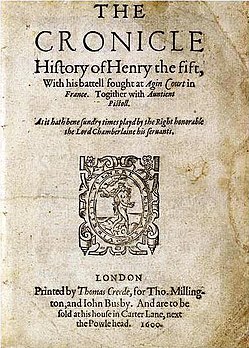Henry V By William Shakespeare Act2 Scene2

HENRY: The mercy that was quick in us but late,
By your own counsel is suppress’d and kill’d:
You must not dare, for shame, to talk of mercy;
For your own reasons turn into your bosoms,
As dogs upon their masters, worrying you.
See you, my princes, and my noble peers,
These English monsters! My Lord of Cambridge here,
You know how apt our love was to accord
To furnish him with all appertinents
Belonging to his honour; and this man
Hath, for a few light crowns, lightly conspired,
And sworn unto the practises of France,
To kill us here in Hampton: to the which
This knight, no less for bounty bound to us
Than Cambridge is, hath likewise sworn. But, O,
What shall I say to thee, Lord Scroop? thou cruel,
Ingrateful, savage and inhuman creature!
Thou that didst bear the key of all my counsels,
That knew’st the very bottom of my soul,
That almost mightst have coin’d me into gold,
Wouldst thou have practised on me for thy use,
May it be possible, that foreign hire
Could out of thee extract one spark of evil
That might annoy my finger? ’tis so strange,
That, though the truth of it stands off as gross
As black and white, my eye will scarcely see it.
Treason and murder ever kept together,
As two yoke-devils sworn to either’s purpose,
Working so grossly in a natural cause,
That admiration did not whoop at them:
But thou, ‘gainst all proportion, didst bring in
Wonder to wait on treason and on murder:
And whatsoever cunning fiend it was
That wrought upon thee so preposterously
Hath got the voice in hell for excellence:
All other devils that suggest by treasons
Do botch and bungle up damnation
With patches, colours, and with forms being fetch’d
From glistering semblances of piety;
But he that temper’d thee bade thee stand up,
Gave thee no instance why thou shouldst do treason,
Unless to dub thee with the name of traitor.
If that same demon that hath gull’d thee thus
Should with his lion gait walk the whole world,
He might return to vasty Tartar back,
And tell the legions ‘I can never win
A soul so easy as that Englishman’s.’
O, how hast thou with ‘jealousy infected
The sweetness of affiance! Show men dutiful?
Why, so didst thou: seem they grave and learned?
Why, so didst thou: come they of noble family?
Why, so didst thou: seem they religious?
Why, so didst thou: or are they spare in diet,
Free from gross passion or of mirth or anger,
Constant in spirit, not swerving with the blood,
Garnish’d and deck’d in modest complement,
Not working with the eye without the ear,
And but in purged judgment trusting neither?
Such and so finely bolted didst thou seem:
And thus thy fall hath left a kind of blot,
To mark the full-fraught man and best indued
With some suspicion. I will weep for thee;
For this revolt of thine, methinks, is like
Another fall of man. Their faults are open:
Arrest them to the answer of the law;
And God acquit them of their practises!
